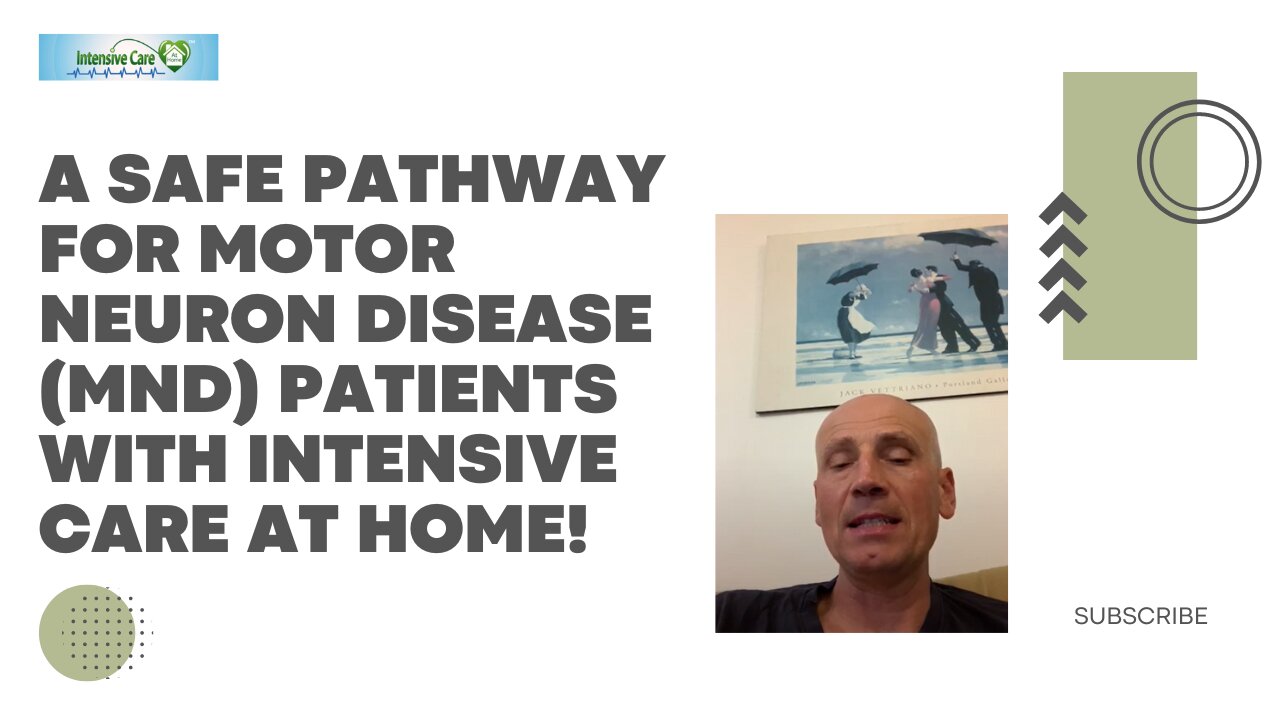Premium Only Content

A Safe Pathway for Motor Neuron Disease (MND) Patients with Intensive Care at Home!
A Safe Pathway for Motor Neuron Disease (MND) Patients with Intensive Care at Home!
Book your free 15-minute phone consultation here
http://intensivecarehotline.com/scheduling-appointment/
Call directly 24/7
+1 415-915-0090 USA/Canada
+44 118 324 3018 UK
+6141 094 2230 Australia
Email support@intensivecarehotline.com
Get 1:1 consulting and advocacy
1:1 phone counselling
http://intensivecarehotline.com/one-on-one-counselling/
Become a member for families of critically ill Patients in Intensive Care
https://intensivecarehotline.com/intensivecaresupport-org-membership/
Immediate action steps http://intensivecarehotline.com/take-control-take-charge/immediate-action-steps/
https://intensivecareathome.com
And if you need a medical record review, click on the link and we can help you with reviewing your loved one’s medical records while they’re in ICU.
https://intensivecarehotline.thrivecart.com/review-of-medical-records/
Facebook Page: https://www.facebook.com/IntensiveCareHotline
Twitter: https://twitter.com/icuhotline
Hi, it’s Patrik Hutzel from Intensive Care at Home, where we provide tailor-made solutions for long-term ventilated adults and children with tracheostomies. And where we also provide tailor-made solutions for hospitals and intensive care units, whilst providing quality services for long-term ventilated patients and medically complex patients at home, including home TPN.
In today’s blog, I want to talk about pathways for patients with MND or Motor Neuron Disease. We have first-hand information from a family who had their 51-year-old loved one diagnosed with MND or Motor Neuron Disease late last year. He was moved to a hospital, and he was told that he only has a few weeks to live and that the progressive nature of motor neuron disease would kill him very quickly. There were no options being given such as a tracheostomy and home care with Intensive Care at Home, for example.
What happened in the end was the client was put on BIPAP and then was sent home to die with a support worker agency. And as soon as the client was sent home and the support worker saw that the client was on BIPAP (Bilevel positive airway pressure), the support worker said, “Well, I can’t look after BIPAP.” Of course not, because that’s an intensive care nursing skill. And the client then passed away apparently within less than 24 hours at home. That is utterly disgraceful, and it should not happen in a country like Australia, especially now with the NDIS (National Disability Insurance Scheme) and services like Intensive Care at Home available.
So, let me illustrate what that might look like in an ideal scenario for someone being diagnosed with MND. We have a couple of clients at home with MND that have tracheostomies and are ventilated, 24 hours a day, and that live a very good quality of life at home because they have 24-hour intensive care nursing at home with our service Intensive Care at Home, and it’s NDIS funded.
So, what should have happened in this scenario is the family should have been informed by the NDIS and by the NDIS support coordinator what options are available. The challenge that we are finding is most NDIS support coordinators are unfortunately not clinical, and they don’t really have an understanding what MND, or motor neuron disease is and what pathways there are for motor neuron disease.
And again, for example, with one of our other MND clients, what happened was he was on BIPAP initially and then they reached out at that stage saying, “Hey, what if I need a tracheostomy? Can you help me at home with nursing care?” We said, “Yes, of course we can.” And then a few months later, the client ended up in ICU with an aspiration pneumonia, which is not unusual for patients with MND and BIPAP. And after he ended up in ICU with an aspiration pneumonia, ended up being intubated, and then ended up with a tracheostomy. And a few weeks later, we took the client home. And the same could have happened with this particular gentleman if the family had either reached out to us or had reached out to an NDIS support coordinator who understands medical issues, but most NDIS support coordinators don’t. So, this particular client could still be alive had he been referred onto the right services, to the right NDIS support coordinator.
Continue reading at: https://intensivecareathome.com/a-safe-pathway-for-motor-neuron-disease-mnd-patients-with-intensive-care-at-home/
-
 14:27
14:27
Intensive Care at Home
4 days agoShould My Mom Go Home with INTENSIVE CARE AT HOME for Palliative Care or Stay in ICU for Treatment?
81 -
 9:02:15
9:02:15
Dr Disrespect
18 hours ago🔴LIVE - DR DISRESPECT - MARVEL RIVALS - RANKED
367K58 -
 1:00:46
1:00:46
The StoneZONE with Roger Stone
9 hours agoFake News Attack on Tulsi Gabbard! | The StoneZONE w/ Roger Stone
59.7K21 -
 2:24:08
2:24:08
WeAreChange
12 hours agoElon Musk & Donald Trump: The Emergency Halt That Saved Us
85.7K58 -
 1:13:11
1:13:11
Flyover Conservatives
1 day agoWARNING! Is Bitcoin CIA-Controlled? – The Shocking Reality of Digital Assets - Clay Clark | FOC Show
38K10 -
 2:00:37
2:00:37
Space Ice
15 hours agoSpace Ice & Redeye Try To Figure Out Seagal's Most Incoherent Movie
146K7 -
 1:00:36
1:00:36
PMG
1 day ago $13.34 earned"Santa Trump is Giving Us Hope - But Will Johnson Stand Strong?"
108K14 -
 54:30
54:30
LFA TV
1 day agoThe German Strongman’s Arrival Is Imminent | Trumpet Daily 12.18.24 7PM EST
80.7K6 -
 2:04:11
2:04:11
Melonie Mac
13 hours agoGo Boom Live Ep 32! Soul Reaver Remastered!
66.7K10 -
 39:11
39:11
Sarah Westall
11 hours agoDigital Slavery and Playing with Fire: Money, Banking, and the Federal Reserve w/ Tom DiLorenzo
83.1K8